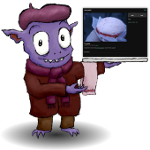 On the 2 of November Mediagoblin 0.1 has been released. What ? You don’t know what’s the GNU Mediagoblin project ?
On the 2 of November Mediagoblin 0.1 has been released. What ? You don’t know what’s the GNU Mediagoblin project ?
Mediagoblin GNU is a project that has as goal to get an open source,sort of, “clone” of deviantART, Flickr, Picasa Web Albums and generally of all the online sites that let you upload your media (photos, videos, etc.). Why do it? For the freedom of course, what’s more important than that ?
Some of the problems that the project would like to solve cover the actual ownership of the shared content, data portability and privacy.
Mediagoblin is released under the AGPLv3, which means that if third parties put up services based on Mediagoblin they’ll be obligated to share changes even if they don’t “distribute” the software in the traditional sense.
I forget to say, they are working to get a federated photo sharing site, so there will be multiple sites that share the same information.
Continue reading »


 On the 2 of November Mediagoblin 0.1 has been released. What ? You don’t know what’s the
On the 2 of November Mediagoblin 0.1 has been released. What ? You don’t know what’s the  I’ve already talked about
I’ve already talked about